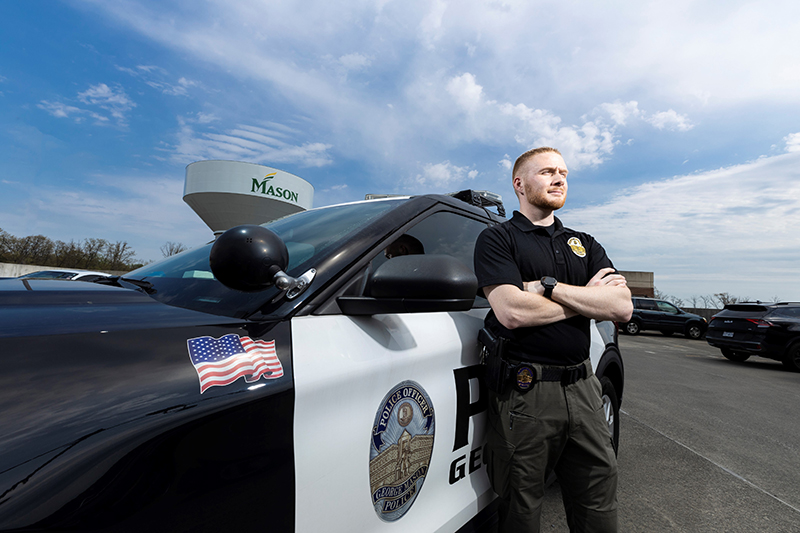In This Story

In March 2024, George Mason University detective Ryan Grant made national headlines when tripped safety cameras alerted police that a license tag associated with someone with an outstanding warrant was driving on campus. Grant, who is a double Schar School graduate, not only made the arrest but also completed the driver’s DoorDash delivery (to Mason students, who, the story says, were happy to see him). Here’s our profile of Grant from last year.
Until he was 12, Ryan Grant wanted to be a firefighter. “Then I came to my senses somewhere in high school,” he said. He eventually altered his course to another schoolboy ideal: Policeman.
The New Jersey native is now a detective on the George Mason University police force, working to keep the campuses safe by investigating cases from theft to sexual assaults. What makes his job even better, the four-year veteran of the force said, is that Mason is his alma mater, having earned a bachelor of science from the Schar School of Policy and Government’s public administration program, with a minor in criminology, in 2019, and a master of public administration degree from the Schar School in 2022.
After completing his BS degree he enrolled in the police academy, graduating in 2019 and began as a campus patrol officer—including bicycle patrol and the infamous midnight shift—in 2020. As a sworn officer scouring the campuses—he’s served at each Mason campus except Korea—Grant said he developed relationships that are now paying off in his role as a detective.
“People feel more comfortable engaging with us in a casual setting,” he said, “but also they feel more comfortable reporting crimes to us or seeing us out as a resource for them.”
Grant was inspired to pursue law enforcement by an uncle who was a police chief. He came to Mason, he said, on the advice of a cousin who earned their master of business administration degree from Mason and, not insignificantly, “out-of-state tuition was comparable to in-state at Rutgers.”
He found that internship opportunities to explore government and law enforcement abounded at Mason, thanks to its location and relationships with regional emergency management agencies. Those internships led to an important moment of self-discovery: “That kind of showed me that I’m not able to sit at a desk for long periods of time,” he said with a knowing grin. “I kind of need to be out engaging with people and doing things.”
That impulse led him to the Mason police force. “And the biggest part of being a university employee was the tuition benefit,” he said. “So I started my graduate program, literally, as soon as I could.” His entire expense for his MPA degree was “one summer course I paid out of pocket.”
It also was important that the Schar School program’s classes were flexible, making it possible to continue working fulltime while earning his degree.
Advancement in law enforcement does not always require advanced degrees but Grant said once he realized the MPA program had an emergency management and homeland security element, “that definitely piqued my interest. And then seeing the specific classes and professors within that degree track really answered a lot of questions for me.”
“Ryan stood out as an intellectually curious and dedicated student,” said one of his MPA instructors, Associate Professor John Marvel. “From the beginning of his coursework, his aim was to apply what he learned to a career in law enforcement. In particular, he wrote an excellent research paper for my organizational theory course on the things law enforcement agencies can do to recruit and retain high-performing personnel.”
Grant’s research skills were augmented by other Schar School courses, including one he took with Professor Katrin B. Anacker, who instructed his policy and program evaluation course.
“The data research was not super interesting to me,” he admitted, mentioning learning how to master advanced analytic tools such as SPSS statistics software. “But she found a way to show how it could apply to what I’m doing at work and where my general research interests were. Her class definitely opened my eyes to how research could be more applicable to what I was doing.”
For her part, Anacker sees a bright future for the detective.
“I was impressed with his public speaking skills, which are important when pursuing a leadership role,” she said. “He brought energy and enthusiasm to each class, which speaks to his determination to succeed in his chosen profession.”

